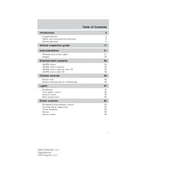Ford F-650 2005 Owner's Manual


To reset the oil change light, turn the ignition to the "On" position without starting the engine. Press the "Reset" button on the dashboard until the oil light flashes, then release the button. The light should reset after a few moments.
The recommended tire pressure for a Ford F-650 2005 typically ranges between 75-80 PSI for front tires and 80-85 PSI for rear tires. Always check the driver's door placard for specific recommendations for your vehicle.
For a Ford F-650 2005, it is recommended to use 15W-40 diesel engine oil that meets API CJ-4 specifications. Always refer to the owner's manual for the most accurate information.
Start by checking the fuses and relays related to the A/C system. Ensure the refrigerant level is adequate and inspect for any leaks. If the issue persists, it might require professional diagnostics.
Common causes of engine overheating include low coolant levels, a faulty thermostat, a clogged radiator, or a malfunctioning water pump. Regular maintenance and inspections can help prevent these issues.
To replace the brake pads, lift the vehicle securely and remove the wheel. Unbolt the brake caliper and remove the old pads. Install new pads and reassemble the components. Always ensure pads are properly aligned and secured.
Poor fuel economy can be caused by factors such as under-inflated tires, dirty air filters, or malfunctioning oxygen sensors. Regular maintenance can help improve fuel efficiency.
To check the transmission fluid, ensure the vehicle is on a level surface and warmed up. Locate the transmission dipstick, remove it, and wipe it clean. Reinsert it, then remove it again to check the level.
Check the battery connections and ensure they are clean and tight. Inspect the starter and alternator for any visible issues. If the problem persists, further diagnostic testing may be necessary.
It is recommended to replace the air filter every 15,000 to 30,000 miles. However, if you operate in dusty conditions, more frequent replacements may be necessary.